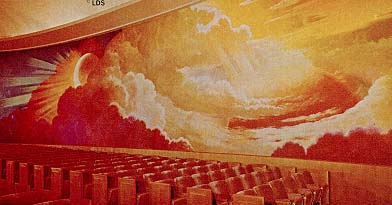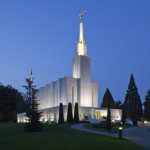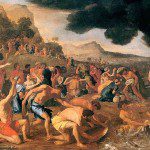
As the image above indicates, I’ll be giving an English-language presentation tomorrow, Tuesday, at 8 PM Paris time — which is twelve noon Utah time — to students in Europe who are enrolled in the BYU Pathway program. It should be fun — for me, at least.

And then, at 7:00 PM tomorrow, I’ll be up in the Salt Lake Valley speaking to a small group there on the topic of
“When the Bishops Took Charge: The Council of Nicea and Its Sisters”:
With the passing of the general authorities of the ancient Church (the apostles), local authorities (bishops) and eventually emperors felt obliged to step into the leadership vacuum. Lacking organized quorums, they convened councils, which functioned rather like political conventions. All of the seven “ecumenical councils” of ancient Christendom met in what is today Turkey. In the absence of revelation, the debates and the voting in these councils drew on scripture mingled with (mostly Middle Platonic) philosophy to define doctrines and enforce unity—with results that continue until our day.
The event will take place in West Jordan, Utah, in the small building with the four columns that is located in the background of the photograph above. Here’s the general series information for tomorrow night’s lecture:
Learn Our Religion offers an exciting lecture series with many of our popular, edifying, and entertaining headliners who travel with us and lecture on cruises and land tours all over the world! Our schedule is below with additional dates to be announced. These lectures will be held in our new Jordan Event Center located at 9112 S. Redwood Road, West Jordan, Utah (behind the Cruise Lady office).The lectures will be held from 7-8:30pm. Some headliners will have a few minutes for question and answers after the lecture. Due to limited seating reservations are required.
Please contact Learn Our Religion at 801-916-7677 to register.
Pricing For LecturesIn-PersonSingle Ticket: $610-pack of Lectures: $5520-pack of Lectures: $100Streaming1 Household Ticket for streaming: $1010 Pack: $90*Streaming live or recordings are now the same price per household.***Reservations are required to attend all lectures, or to have access to view lectures virtually.

Interpreter Radio Show — August 20, 2023
In the episode of The Interpreter Radio Show that was broadcast on 20 August 2023, Bruce Webster, Robert Boylan, and Kris Frederickson discussed Come, Follow Me New Testament lesson 38. They also discussed Richard Bushman’s statements about the source of the Book of Mormon, two recent articles in Interpreter, and the 2023 FAIR Conference.
Those distinct discussions have now been archived as distinct files, emancipated from commercial and other breaks, and made available to you at your own sovereign convenience and at absolutely no charge — excepting the “New Testament in Context” portion of the show for the Come, Follow Me New Testament lesson 38, “Be Ye Reconciled to God” covering 2 Corinthians 1–7, which will be posted separately on Tuesday, 5 September 2023.
The Interpreter Radio Show can be heard as it happens, without a net . . . well, each and every single Sunday evening from 7 to 9 PM (MDT), on K-TALK, AM 1640. Or else, if you prefer, you can listen live on the Internet at ktalkmedia.com.

I’ve finally gotten around to reading John H. Walton, The Lost World of Adam and Eve: Genesis 2-3 and the Human Origins Debate (Downers Grove, IL: IVP Academic, 2015). It’s an extraordinarily interesting read, thus far.
“In this book,” Professor Walton writes, “I will contend that the perceived threat posed by the current consensus about human origins is overblown.” And the way he sets out to ground his contention is intriguing.
For one thing, he argues that Genesis 1:1 is a literary introduction to, but not actually a part of, the creation narrative that is about to be given (26-27).
As Genesis 1:2 opens, we find that material is already present (earth, seas) and that this inchoate world is covered with water and darkness. Again, we know that ancient Near Eastern cosmologies share this characteristic. Darkness and sea are conditions of non-order. But if material is already present, we are immediately prompted by the text to ask why it does not begin with no material if it is going to recount material origins. This should make us curious.
The most important descriptor that is offered in Genesis 1:2 is the Hebrew combination ṯōhū wā-ḇōhū, translated in the NIV “formless and empty.” The implications are that materiality is generally present but without shape, and that the stage is empty of players. . . .
The combination ṯōhū and ḇōhū occurs two other times in the Hebrew Bible (Is 34:11 and Jer. 4:23), and ḇōhū never occurs by itself. These uses offer no basis on which to determine that ḇōhū refers to emptiness. Usage is insufficient to establish its meaning. Sadly, then, we have to be content with what we can determine about the meaning of ṯōhū. In its twenty occurrences (more than half in Isaiah), we find that it often describes a wilderness or wasteland (e.g., Deut 32:10; Job 6:18; 12:24; Ps 107:40). It can describe the results of destruction (Jer 4:23). It is used to convey things that have no purpose or meaning (e.g., idols, Is 41:29, and those who make them, Is 44:9). All its uses can be consolidated in the notion of things that are of no purpose or worth. They are lacking order and function.
It now becomes clear that the starting condition in Genesis 1:2, the pre-creation situation that describes nonexistence, is a condition that is not lacking material. Rather, it is a situation that is lacking order and purpose. “Formless” is not a good choice because it still implies that material shape is the focus. It is not. This leads us to the conclusion that for Israel, creation resolves the absence of order and not the absence of material. If this “before” picture conveys “nonexistence,” we deduce that “existence” is not a material category for them, it is a functional category pertaining to an ordered condition. (27-28)













